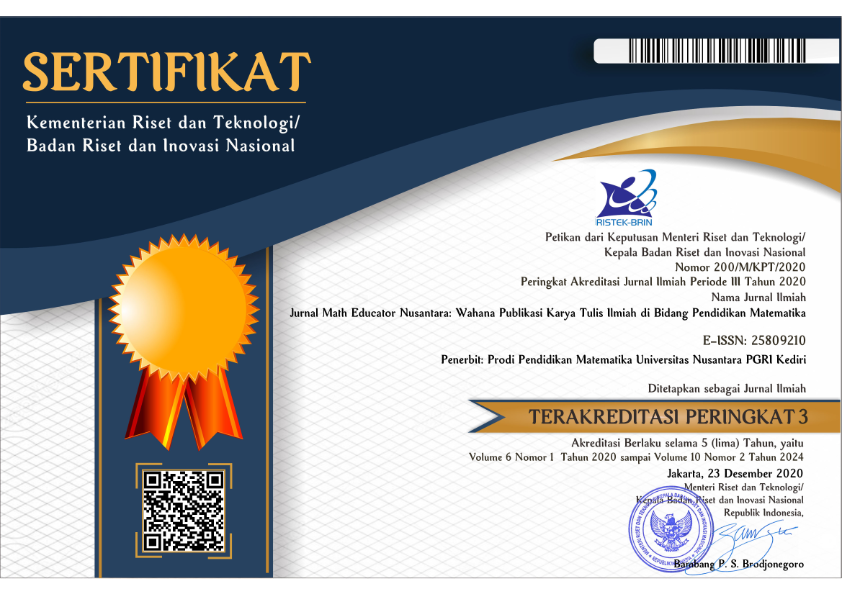Soft skills development of students in learning mathematics
DOI:
https://doi.org/10.29407/jmen.v9i2.20771Keywords:
Soft Skills, Development, Learning MathematicsAbstract
The aim of the research is to describe the soft skill development of students in learning mathematics. This research was conducted at MTsN 9 Jombang in the even semester of the 2022/2023 school year. Prospective subjects are students of class IXC, totaling 29 students. Next, one subject is selected who has the highest soft skills score to be analyzed in depth and comprehensively. The main instrument is the researcher himself and the supporting instruments include problem solving test sheets, observation guides and interview guides. Data collection techniques using problem-solving tests about Prism, observation and in-depth interviews. The credibility of the data in this study uses source triangulation. The technical stages of data analysis include data reduction, data presentation, and the last step is conclusion. The results showed that the development of verbal mathematical communication soft skills was in the high category, and the development of non-verbal mathematical communication soft skills was in the high category. Development of creative soft skills in the medium category. Development of critical thinking soft skills in the high category. Development of soft skills to solve problems in the high category. Development of stress management soft skills in the high category. Soft skills collaboration in the high category. Time management soft skills in the high category.
References
Alrajeh, T. S., & Shindel, B. W. (2020). No Title. Student Engagement and Math Teachers Support. Journal on Mathematics Education, 11(2), 167–180. https://doi.org/https://doi.org/10.22342/jme.11.2.10282.167-180
Amabile, T. M. (2018). Creativity in context: Update to the social psychology of creativity.
Boaler, J. (2015). Mathematical mindsets: Unleashing students’ potential through creative math, inspiring messages and innovative teaching. John Wiley & Sons.
Brouwers, A., & Tomic, W. (2000). A longitudinal study of teacher burnout and perceived self-efficacy in classroom management. Teaching and Teacher Education, 16(2), 239–253. Doi: https://doi.org/10.1016/S0742-051X(99)00057-8
Brown, M., & Ralph, S. (1998). Time Management for Teachers: A Practical Guide to Effective Strategies and Techniques. Northcote House.
Cohen, S., Kamarck, T., & Mermelstein, R. (1983). A global measure of perceived stress. Journal of Health and Social Behavior, 385–396. Doi: https://doi.org/10.2307/2136404
Covey, S. R. (1989). The 7 habits of highly effective people: Powerful lessons in personal change. Simon & Schuster.
Csikszentmihalyi, M. (1997). Flow and the psychology of discovery and invention. HarperPerennial, New York, 39,.
Daher, W. (2020). Students’ positioning and emotions in learning geometric definition. Journal On Mathematics Education, 11(1), 111–134. https://doi.org/https://doi.org/10.22342/jme.11.1.9057.111-134
Darma, Y., Firdaus, M., & Irvandi, W. (2020). Soft Skills Matematis Mahasiswa Calon Guru Matematika. Edukasi: Jurnal Pendidikan, 18(2), 225–239.
Duckworth, A. L., Peterson, C., Matthews, M. D., & Kelly, D. R. (2007). Grit: perseverance and passion for long-term goals. Journal of Personality and Social Psychology, 92(6), 1087-1101. Doi: https://doi.org/10.1037/0022-3514.92.6.1087
Duval, R. (2006). A Cognitive Analysis Of Problems Of Comprehension In A Learning Of Mathematics. Educational Studies In Mathematics, 61(1), 103–131. Doi: https://doi.org/10.1007/s10649-006-0400-z
Dweck, C. S. (2006). Mindset: The new psychology of success. Random house.
Fisher, R., Ury, W. L., & Patton, B. (2011). Getting to yes: Negotiating agreement without giving in. Penguin.
Hidayati, F. H. (2020). Lesson Study: Peningkatan Soft Skills Calon Guru Matematika. Integral: Pendidikan Matematika, 11(1), 42–53.
Hidayati, W. S ., Iffah, J. D. N., & Raffi, M. . (2021). Identifikasi Soft Skills Guru Dalam Pembelajaran Matematika. Third Conference on Research and Community Services STKIP PGRI Jombang.
Hidayati, W. S., Iffah, J. D. ., & Rafi, M. (2021a). Identifikasi Soft Skills Guru Dalam Pembelajaran Matematika. Webinar Nasional STKIP PGRI Jombang, 1–11.
Hidayati, W. S., Iffah, J. D. ., & Rafi, M. F. (2021b). Model Instrumen Soft Skills dalam Pembelajaran Matematikas Peserta didik SMA di Jawa Timur. Laporan Akhir PDUPT.
Lakein, A., & Leake, P. (1973). How to get control of your time and your life. New American Library.
Mason, J., Burton, L., & Stacey, K. (2010). Thinking Mathematically Secon Edition. Pearson Education Limited.
McMillan, J. H., & Schumacher, S. (2010). Research in education: Evidence-based inquiry. Pearson.
Moleong. (2017). Metodologi Penelitian Kualitatif. PT Remaja Rosdakarya.
NCTM. (2000). Principles and Standards for School Mathematics. NCTM.
Paul, R., & Elder, L. (2006). Critical thinking: The nature of critical and creative thought. Journal of Developmental Education, 30(2), 34.
Pendidikan, K. B. S. K. dan A. (2022). Capaian Pembelajaran Pada Pendidikan Anak Usia Dini, Jenjang Pendidikan Dasar, dan Jenjang Pendidikan Menengah Pada Kurikulum Merdeka.
Permendikbud. (2016). Standar Proses Pendidikan Dasar dan Menengah.
Podkhodova, N., Snegurova, V., Stefanova, N., Triapitsyna, A., & Pisareva, S. (2020). Assessment of mathematics teachers’ professional competence. Journal On Mathematics Education, 11(3), 477–500. https://doi.org/https://doi.org/10.22342/jme.11.3.11848.477-500
Purwandari, I., Ekawati, W., & Tristanti, L. B. (2020). Penerapan Model Pembelajaran Problem Based Learning Dengan Media Komat Terhadap Pemecahan Masalah Dan Kecemasan Matematika Siswa. Jurnal THEOREMS (The Original Research of Mathematics), 5(1), 1–12.
Roberts, R. D., Zeidner, M., & Matthews, G. (2007). Emotional intelligence: Knowns and unknowns. Oxford University Press.
Santia, I. (2016). Peningkatan Soft Skill Mahasiswa Calon Guru Matematika Melalui Critical Lesson Study. PEDAGOGIA: Jurnal Pendidikan, 5(2), 157–168. https://doi.org/10.21070/pedagogia.v5i2.247
Seligman, M. E. (2006). Learned optimism: How to change your mind and your life. Vintage.
Silviana, D., & Hadi, A. M. (2019). Profil Kemampuan Komunikasi Visual-Verbal Dalam Pemecahan Masalah Matematika. Education Journal, 1(2), 87–94.
Slavin, R. E. (2015). Cooperative learning in elementary schools. Education, 43(1), 5–14. https://doi.org/10.1080/03004279.2015.963370
Sugiyono. (2018). Metode Penelitian Pendidikan Kualitatif Untuk Penelitian yang Bersifat Eksploratif, Eenterpretif, Interaktif dan Konstruktif. Alfabeta.
Swartz, R. J., & Parks, S. (1994). Infusing the Teaching of Critical and Creative Thinking into Content Instruction: A Lesson Design Handbook for the Elementary Grades. Critical Thinking Press and Software.
Tristanti, L. B. (2017). Pengaruh Model Pembelajaran Kooperatif Tipe TAI dan Problem Based Learning (PBL) Terhadap Pemahaman Konsep Bangun Ruang Siswa. Jurnal Pendidikan Matematika FKIP Univ. Muhammadiyah Metro, 6(3), 338–349.
Tristanti, L. B., Akbar, S., & Rahayu, W. A. (2021). Pengaruh Media Pembelajaran Game Edukasi Berbasis Construct terhadap Kemampuan Pemecahan Masalah dan Hasil Belajar Siswa. Mosharafa: Jurnal Pendidikan Matematika, 10(1), 129–140.
Tristanti, L. B., Ernawati, W., & Hidayati, W. S. (2021). Penerapan Video Media Pembelajaran Penjumlahan Bilangan Bulat. Mosharafa: Jurnal Pendidikan Matematika, 10(3), 413–424.
Tristanti, L. B., & Hidayati, W. S. (2020). The Implementation of Cooperative Learning Type Team Assisted Individualisation for Teaching 3D Geometry. Journal of Education and Learning (EduLearn), 14(2), 279–288.
Tristanti, L. B., & Iffah, J. D. N. (2022). Pengembangan Media Pembelajaran Geometri Ruang Berbasis Android Berbantuan Smart Apps Creator dalam Meningkatkan Kemampuan Pembuktian. AKSIOMA: Jurnal Program Studi Pendidikan Matematika, 11(3), 1716–1728. DOI: http://dx.doi.org/10.24127/ajpm.v11i3.5103
Van de Walle, J. A., Karp, K. S., & Bay-Williams, J. M. (2014). Elementary and middle school mathematics. Pearson.
Wahyu, M. N., Sutiarso, S., & Bharata, H. (2020). Pembelajaran Soft Skill Komunikasi untuk Meningkatkan Kemampuan Komunikasi Matematis Siswa. Jurnal Cendekia: Jurnal Pendidikan Matematika, 4(1), 406–413. DOI: https://doi.org/10.31004/cendekia.v4i1.228
Yunianto, W., Prahmana, R. C. I., & Crisan, C. (2021). Indonesian mathematics teachers’ knowledge of content and students of area and perimeter of rectangle. Journal On Mathematics Education, 12(2), 223–238. doi: 10.22342/jme.12.2.13537.223-238.
Downloads
Published
Issue
Section
License
Authors who publish with this journal agree to the following terms:
- Copyright on any article is retained by the author(s).
- The author grants the journal, the right of first publication with the work simultaneously licensed under a Creative Commons Attribution License that allows others to share the work with an acknowledgment of the work’s authorship and initial publication in this journal.
- Authors are able to enter into separate, additional contractual arrangements for the non-exclusive distribution of the journal’s published version of the work (e.g., post it to an institutional repository or publish it in a book), with an acknowledgment of its initial publication in this journal.
- Authors are permitted and encouraged to post their work online (e.g., in institutional repositories or on their website) prior to and during the submission process, as it can lead to productive exchanges, as well as earlier and greater citation of published work.
- The article and any associated published material is distributed under the Creative Commons Attribution-ShareAlike 4.0 International License















